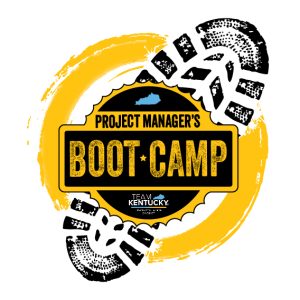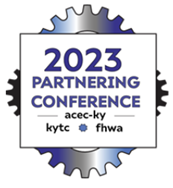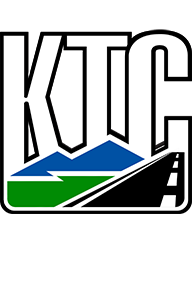Search for articles or browse our knowledge portal by topic.
Project Management Training
| Project Management Training | Transportation Project Classification | |||
| Capital Improvement Projects | Safety Projects | Asset Management Projects | Maintenance Projects | |
| 1.0 Project Management Training Overview | x | x | x | x |
|
x | x | x | x |
|
x | x | x | x |
|
x | x | x | x |
|
x | x | x | |
|
x | x | x | x |
| x = Information from the topic may be applicable for the project classification. | ||||
Terms
The full definition for terms included in this article (listed below) can be found in the HKP Glossary.
- Leadership
- Soft Skills
Maintaining a well-trained and knowledgeable workforce is integral to the Kentucky Transportation Cabinet (KYTC) fulfilling its mission. Competent Project Managers (PMs) can improve project delivery success rates. A successful project meets the defined scope with quality solutions and deliverables on schedule and within the specified budget. Knowledge of project management skills are relevant to the delivery of all project types — capital improvement, safety, asset management, and maintenance.
The HKP article Department of Highways Training Resources provides a more extensive list of trainings offered to KYTC staff.

Trainings focused on project management skills are categorized into five areas:
- Project Management
- Transportation Decision Making
- Leadership
- Consultant and Contract Administration
- Communication / Soft Skills
PMs need knowledge in each of these areas to deliver successful projects.
1.1 Project Management
Project management training focuses on the tasks, responsibilities, and knowledge needed to manage a project.
1.1.1 AASHTO Technical Committee on Project Management Webinars
The AASHTO Technical Committee on Project Management offers webinars throughout the year on transportation project management. They are presented by practitioners and project management experts from across the country. Past webinars have covered topics such as cost estimating, change management, working with consultants, budgeting, and communication. They can be viewed by visiting the Project Management Webinar Series webpage.
1.1.2 Project Manager’s Boot Camp
Sponsored by the Division of Highway Design, the purpose of Project Manager’s Boot Camp (PMBC) is to help KYTC continue improving its success rate in delivering the Enacted Highway Plan. Successful project delivery helps the Cabinet fulfill its mission and enriches the lives of all Kentuckians. Attendees improve their project management skills and learn about the roles and responsibilities of PMs and other subject-matter experts (SMEs) involved in projects. Information on the PMBC can be found on the Kentucky Transportation Center website.
This eight-day training covers the following topics:
- Project Management: Your Project and the KYTC Mission
- Understand the KYTC Mission
- Roles and Responsibilities of a Project Manager
- Change is inevitable
- Project Management: The Task at Hand
- Overview of Kentucky’s Enacted Highway Plan
- Project Costs and Schedules
- Project Management described
- Importance of Communication
- Work Breakdown Structures
- Project Management: Where’s the Data and Money for My Project?
- Project Cost Management
- Division of Planning Resources
- Transportation Funding
- Program Management
- Project Management: Where’s my Help?
- Managing Consultants
- Professional Services
- Professional Ethics
- Project Management: DEA Day at the Boot Camp!
- Overview of the NEPA Process
- Critical Path of the NEPA Process
- Clean Water Act, Endangered Species Act
- Project Management: You Mean There’s More Engineering to this than the Roadway?
- Division of Structural Design
- Traffic Operations in Project Development
- Utility and Rail Coordination
- Highway Design in Project Development
- Project Management: Not in My Backyard! I Don’t Have the Time!
- Right of Way in Project Development
- Office of Legal Services and Condemnation Process
- Project Risk and Time Management
- Project Management: Get Me to the Finish Line!
- Bidding and Construction Procurement Process
Project Manager’s Boot Camp Xpress is a two-day version of PMBC required for all consultant PMs. Xpress covers many of the topics addressed by PMBC in an abbreviated form and communicates the importance of consultant PMs to the Cabinet’s success.
1.2 Transportation Decision Making
Transportation decision-making requires PMs to balance engineering needs with social, economic, and environmental factors (1). Making sound project-related decisions requires PMs to fully understand KYTC’s project delivery core processes. The Highway Design Manual Section 200 and Exhibit 200-01 present an overview of these processes (Figure 1).
To successfully lead projects, PMs should be familiar with many subjects, like the National Environmental Policy Act (NEPA) process, public involvement activities, right-of-way acquisition, and utility coordination, to name a few. A PM’s knowledge of these areas does not need to be at the same level as a SME. However, they need to understand how each component affects the project scope, schedule, budget, and quality (e.g., if condemnation is used to acquire right of way, the PM needs to know the length of time it generally takes to complete the condemnation process to acquire a parcel).
1.2.1 ACEC/KYTC/FHWA Partnering Conference
The annual ACEC/KYTC/FHWA Partnering Conference takes place every autumn and often includes presentations focused on project management. Conference participants include KYTC staff from multiple branches and divisions, FHWA representatives, members of the engineering consulting industry, and local government staff. Past presentations are available on the KYTC Division of Highway Design website.
1.2.2 National Highway Institute Trainings
Established by Congress in 1970 as the FHWA’s training and education arm, the National Highway Institute (NHI) has a long and rich history of innovation and expertise in delivering transportation training (2). A full listing of the courses offered can be found at the NHI Course Search Page. Below are classes relevant to transportation decision making and project management. Typically, the Division of Highway Design is responsible for organizing NHI trainings pertinent to PMs.

- NEPA and the Transportation Decision Making Process
- Public Involvement in the Transportation Decision Making Process
- Real Estate Acquisition under the Uniform Act: An Overview
- Introduction to Utility Coordination for Highway Projects
- Utility Coordination for Highway Projects
- Risk Management
1.3 Leadership Training
The Project Management Institute defines Leadership as the ability to guide, motivate, and direct a team (3). Leadership skills include negotiation, resilience, communication, problem solving, critical thinking, and interpersonal skills (3). Leadership, while not on the technical side of project management knowledge, is essential to the success of a project and for meeting KYTC’s goals. Assuming leadership on a project gives PMs the confidence to navigate difficult situations and instills in them a sense of ownership and responsibility that improves the chances of project success. KYTC’s Office of Human Resource Management offers the following leadership training opportunities:
1.3.1. Leadership Character Program
A series of courses designed to help KYTC employees develop their leadership knowledge, skills, and abilities. This program focuses on developing the employee’s leadership character. The Program consists of five classes and is open to all Cabinet Employees. More information is available in GAP-512.
1.3.2. Leadership Influence Program
A series of training courses designed to help KYTC employees develop their leadership knowledge, skills, and abilities in leading others through influence. The program consists of five classes and is open to all Cabinet Employees. More information is available in GAP-513.
1.3.3. Advanced Leadership Academy
The KYTC Advanced Leadership Academy (ALA) identifies and develops the employee leadership skills essential to the success of KYTC’s future operations. ALA is a one-year program comprised of training focused on expanding and enhancing the leadership skills of Cabinet employees. These trainings take place both in the classroom and in the field and include mentor interactions, job-shadowing, and group and individual studies. More information is available in GAP-503.
1.4 Consultant and Contract Administration
Understanding how to effectively manage consultants and administer contracts helps KYTC PMs deliver successful projects. Contract administration entails:
- Advertising for and selecting consultants for engineering services
- Developing independent production hours and negotiating contracts
- Managing the consultant as the project progresses, including paying invoices
- Proceeding with contract modifications, when applicable
- Closing out the project, including any consultant evaluations
To learn more about the PM’s role in managing consultant contracts, visit the HKP Managing Consultant Contracts knowledge book.
1.4.1 Divison of Professional Services Portal Training
KYTC’s Division of Professional Services offers training videos that guide users through various Professional Services Portal functions, including dashboard use, consultant management, pending tasks, project-specific contracts, production hour estimate submittal, and project-specific contract modifications. The videos can be found at this link.
A User Guide offers more detailed instructions on how the Professional Services Portal is used by KYTC PMs, consultant PMs, and Professional Services staff. This guide covers both statewide project contract administration and the administration of contracts on projects advertised individually.
1.5 Communication / Soft Skills
PMs spend most of their time communicating with project development team members, SMEs, project stakeholders, the public, and KYTC leadership. Soft skills help PMs communicate effectively with others. Oxford Languages defines soft skills as personal attributes that enable someone to interact effectively and harmoniously with other people. KYTC offers several classes through the Kentucky Enterprise Learning Management System (KELMS) that address communication and soft skills.
- FHWA NEPA Transportation Decisionmaking
- National Highway Institute’s Mission
- A Guide to the Project Management Body of Knowledge (PMBOK Guide), Sixth Edition, 2017
Project Management Guidebook Knowledge Book:
Access the complete Knowledge Book here: Project Management Guidebook
Previous Article: Tools for the Project Manager



